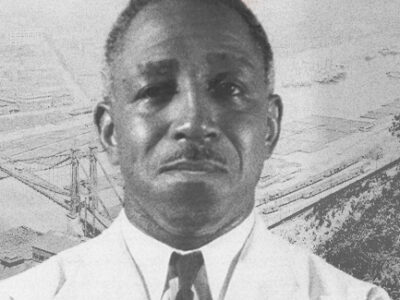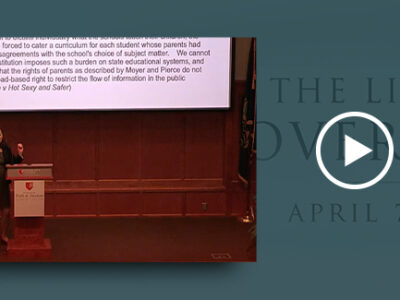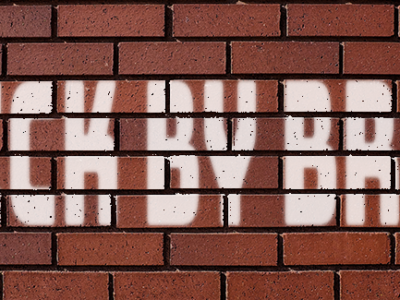Editor’s Note: The “V&V Q&A” is an e-publication from The Center for Vision & Values at Grove City College. Each issue will present an interview with an intriguing thinker or opinion-maker that we hope will prove illuminating to readers everywhere. In this latest edition, the executive director of The Center for Vision & Values, Dr. Paul Kengor, interviews George Weigel, renowned biographer of Pope John Paul II and author of many books, including the recent, The Cube and the Cathedral, an important examination of the status of the Christian faith in contemporary Europe. This is the third in a series of Q&As with participants in the forthcoming April 12-13 conference, “The De-Christianization of Europe: From Nicaea to Nietzsche,” to be held on the campus of Grove City College.
V&V: Dr. Weigel, in your book, The Cube and the Cathedral, what is the “Cube” and what is the “Cathedral,” and why have you chosen them as a metaphor? The “Cube”—the Great Arch of La Defence—embodies a vision of Europe in which democracy rests on a foundation of principled skepticism about the human capacity to know anything with certainty. The “cathedral”—Notre-Dame—is the expression of a different culture, the culture of Christendom, in which I believe the deepest roots of Europe’s commitments to human rights, pluralism, and the rule of law can be found. Europe today is struggling between these two conceptions of its foundations. And so are parts of America, which is, after all, Europe transplanted.
George Weigel:
V&V: The deliberation over the selection of a pope is not exactly a public process. That said, if any outsider has an inside track to the motivations for picking the most recent two popes, it is likely you. Can you tell us if the current pope, Pope Benedict XVI—the former German cardinal, Joseph Ratzinger—was picked for reasons relating to the decline of the faith in Western Europe? In April 2005, the College of Cardinals could not have been unaware that Christianity is dying in Christianity’s historic heartland. That they chose a pope who comes from the very epicenter of European high culture suggests that the cardinals wanted to make another, perhaps last, effort at what John Paul II called the “new evangelization” in Europe—which in this case means re-evangelization…. There was, and is, great concern in the Vatican over a Europe that seems determined to undermine the basic unit of a free society—the family—and in which the autonomy claims of lifestyle libertinism trump all other moral claims.
Weigel:
V&V: When we talk about the decline of the Christian faith in “Europe,” we seem to be referring primarily to Western Europe. But what is the status of the faith in Eastern Europe? The Czech Republic is a thoroughly secular place, demographically and culturally. Poland and Slovakia, on the other hand, remain intact Catholic cultures, and that shows up in their politics. Whether some of the more religiously vibrant new members of the European Union from behind the old Iron Curtain can help ignite a Christian revival in Europe is a very interesting question. Thanks, for example, to the E.U.’s open labor markets, a lot of Catholic churches in the U.K. and Ireland are being filled on Sunday by Poles. We’ll see where that leads over time.
Weigel:
V&V: Of all the East European nations, Poland remained most dedicated to the faith during the Cold War period. Is Poland trending in the same direction as the rest of Europe, from declining birth rates to declining church attendance? Would the late Pope John Paul II be optimistic or pessimistic about the status of the faith in his native country?: Birth rates in Poland are very bad…. John Paul II was a man of hope, so he would be hopeful about Poland today. Hope is not optimism, which is about optics, and that can change. Hope is a sturdier virtue, built on the foundation of faith.
Weigel
V&V: As a Christian, are you optimistic or pessimistic about the future of the faith on the continent generally? What will Europe look like in 50 years? I sketch four scenarios in The Cube and the Cathedral: 1) Europe makes its present arrangements work into the future; 2) Various parts of Europe become extensions of the Islamic world, while others remain part of the West; 3) Europe is re-converted and regains its civilizational morale; and 4) Europe becomes Eurabia. If I were a betting man, I’d bet on #2, but I hope it’s #3.
Weigel:
V&V: Were you surprised by the debate over the (lack of) incorporation of God into the EU Constitution? No, because European high culture is convinced that the freedom project in the West only began with the secularist wing of the Enlightenment. That’s a ridiculously short-sighted view of history, but it’s the dominant view among Euro-elites, and that’s why the preamble argument worked out the way it did.
Weigel:
V&V: How would you best characterize the consensus on the continent—is the typical European an agnostic, atheist, a New Ager, irreligious, non-religious, anti-religious? I think there’s an agnostic mass led by a deeply Christophobic elite, which has convinced believers of their own marginality. I met lots of smart Christians when I spoke at the European Parliament in Brussels last December, but they were so convinced that they were a marginal presence (despite being 40% of the Euro-Parliament) that they were largely ineffective.
Weigel:
V&V: Are we now at that point where—more than ever—it is up to America to carry the flag for Christendom? It looks like Western Europe has happily dropped the mantle. I think it’s up to America to show that the arts of persuasion can function through the application of reason to public life. If Europe could regain its faith in reason, it just may be willing, in time, to consider the reasonableness of faith.
Weigel:
V&V: George Weigel, thanks for talking to us. We look forward to hearing you at the conference. Thank you.
Weigel:




